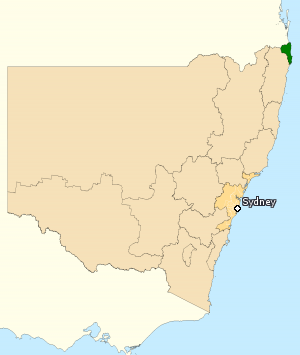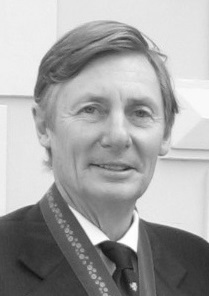
The Country Liberal Party of the Northern Territory (CLP), commonly known as the Country Liberals, is a centre-right and conservative political party in Australia's Northern Territory. In territory politics, it operates in a two-party system with the Australian Labor Party (ALP). It also contests federal elections as an affiliate of the Liberal Party of Australia and National Party of Australia, the two partners in the federal coalition.

Andrew Sharp Peacock was an Australian politician and diplomat. He served as a cabinet minister and went on to become leader of the Liberal Party on two occasions, leading the party to defeat at the 1984 and 1990 elections.

Ian McCahon Sinclair is an Australian former politician who served as a Member of Parliament for 35 years, and was leader of the National Party from 1984 to 1989. He served as either a minister or opposition frontbencher for all but a few months from 1965 to 1989, and later Speaker of the House of Representatives from March to August 1998.
Charles William Blunt is a former Australian politician who served as leader of the National Party of Australia from 1989 to 1990.

The Liberal–National Coalition, commonly known simply as the Coalition or the LNP, is an alliance of centre-right to right-wing political parties that forms one of the two major groupings in Australian federal politics. The two partners in the Coalition are the Liberal Party of Australia and the National Party of Australia. Its main opponent is the Australian Labor Party (ALP); the two forces are often regarded as operating in a two-party system. The Coalition was last in government from 2013 to 2022. The group is led by Peter Dutton, who succeeded Scott Morrison after the 2022 federal election.
This is a list of members of the Australian House of Representatives from 1983 to 1984, as elected at the 1983 federal election. They were together known as the 33rd Parliament.

The Division of Richmond is an Australian electoral division in the state of New South Wales.

The Division of Page is an Australian electoral division in the state of New South Wales.

The 1990 Australian federal election was held in Australia on 24 March 1990. All 148 seats in the House of Representatives and 40 seats in the 76-member Senate were up for election. The incumbent Australian Labor Party, led by Bob Hawke, defeated the opposition Liberal Party of Australia, led by Andrew Peacock, with its coalition partner, the National Party of Australia, led by Charles Blunt, despite losing the nationwide popular and two-party-preferred vote. The result saw the re-election of the Hawke government for a fourth successive term, the first time the ALP had won four consecutive terms.

The 1989 Queensland state election was held in the Australian state of Queensland on 2 December 1989 to elect the 89 members of the state's Legislative Assembly. This was the first election following the downfall of eight-term premier Sir Joh Bjelke-Petersen at the end of 1987.
This is a list of members of the 44th Legislative Assembly of Queensland from 1983 to 1986, as elected at the 1983 state election held on 22 October 1983.

Elections were held in the Australian state of Queensland on 1 November 1986 to elect the 89 members of the state's Legislative Assembly. It followed a redistribution which increased the number of seats in the Assembly from 82 to 89.

State elections were held in South Australia on 25 November 1989. All 47 seats in the South Australian House of Assembly were up for election. The incumbent Australian Labor Party led by Premier of South Australia John Bannon defeated the Liberal Party of Australia led by Leader of the Opposition John Olsen. Labor won 22 out of 47 seats, and secured a majority of 24 with the support of two Independent Labor members.
Members of the New South Wales Legislative Assembly who served in the 48th parliament held their seats from 1984 to 1988. They were elected at the 1984 state election, and at by-elections. The Speaker was Laurie Kelly.

The 1983 Australian federal election was held in Australia on 5 March 1983. All 125 seats in the House of Representatives and all 64 seats in the Senate were up for election, following a double dissolution. The incumbent Coalition government which had been in power since 1975, led by Malcolm Fraser and Doug Anthony, was defeated in a landslide by the opposition Labor Party led by Bob Hawke.
The Western Australian National Party, officially known as the National Party of Australia (WA) Inc, and branded as Nationals WA, is a political party in Western Australia. It is affiliated with the National Party of Australia, but maintains a separate structure and identity. Since the 2021 state election, the Nationals have been the senior party in an opposition alliance with the WA Liberal Party in the state parliament.
Elections were held in the state of Western Australia on 19 February 1983 to elect all 57 members to the Legislative Assembly and 18 members to the 34-seat Legislative Council.
A by-election was held for the Australian House of Representatives seat of Port Adelaide on 26 March 1988. This was triggered by the resignation of Labor Party MP Mick Young over alleged mishandling of campaign donations.

The 1953 New South Wales state election was held on 14 February 1953. It was conducted in single member constituencies with compulsory preferential voting and was held on boundaries created at a 1952 redistribution. The election was for all of the 94 seats in the Legislative Assembly.

The 2025 Australian federal election will be held on or before 17 May 2025 to elect members of the 48th Parliament of Australia. 150 seats in the House of Representatives and likely 40 of the 76 seats in the Senate will be contested. It is expected that at this election, the Labor government of Prime Minister Anthony Albanese will be seeking re-election to a second term in office, opposed by the Liberal/National Coalition under Leader of the Opposition Peter Dutton, minor parties such as the Greens, and independents.











